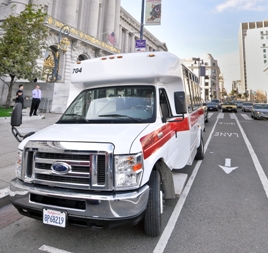
 The SF Paratransit works through a unique contract with Veolia Transportation that involves a network of 23 providers
The SF Paratransit works through a unique contract with Veolia Transportation that involves a network of 23 providers
By Marc Solo
One of Veolia Transportation’s unique paratransit operations is in San Francisco through a contract with the San Francisco Municipal Transportation Agency (SFMTA).
Since 2000, Veolia Transportation has managed a network of 23 independent providers, including taxi companies and van operators, on behalf of SFMTA to meet the needs of passengers with disabilities.
SF Paratransit is broken into three distinct modes of paratransit—taxi, SF Access (ADA paratransit) and group vans. Taxis make up approximately 55 percent of all paratransit services. Unlike many other cities, San Francisco law requires all taxis to participate in the paratransit program and to do so in accordance with SFMTA rules and regulations. Veolia has responsibility for the SF Paratransit Program and works with provider companies on a daily basis to ensure full cooperation in all aspects of service delivery.
Stand up and deliver
By and large, the taxi companies have accepted the requirements of working with the city and have been great partners. We can say with assurance they consistently stand up and deliver, and it makes a huge difference to the program. In fact, customer satisfaction surveys consistently reflect scores in the high 90s for their level of service, reliability and overall satisfaction.
Get more great articles like this one with a subscription to BusRide!
Click here to subscribe.
SF Access mode is a more traditional, advance reservation-based paratransit service. It offers door-to-door service using SFTMA-owned vehicles to complement the contractors’ fleet. Unlike traditional services in other cities, the SF Access mode includes stair assist service, a service feature that assists persons in manual wheelchairs with a set of exterior steps and which carries the patron up and down stairs in their residence. This SFMTA service goes beyond the ADA requirements to address the unique landscape of the city. Historically San Francisco has always done whatever is necessary to meet the needs of the community and not just the law. This service allows San Francisco residents to continue to live independently.
Group van mode, accounting for about 25 percent of SFMTA’s paratransit service offering, is a subscription-based service that requires ADA certification and includes mostly standing orders. Group van mode is extremely important, enabling disabled people to get where they need to be—whether it is to adult healthcare centers or sheltered workshops and nutrition sites—through a combination of for-profit and non-profit van operators.
By providing reliable, affordable transportation, we are enabling the disabled community to enjoy greater independence and accessibility to the city and all that it has to offer.
Making it work
Overseeing 23 service providers can be a challenge but we believe the entire Veolia team takes it all in stride. Carefully detailed contracts with providers define roles and responsibilities as well as expectations for levels of service. Time and vehicle management are closely monitored with the help of the Paratransit Coordinating Council (PCC), a consumer advisory group made up of van and taxi consumers, disability advocacy representatives, transportation providers and government entity representatives.
The PCC is a strong component of the SFMTA’s paratransit program and is highly invested in the process. PCC volunteers participate in the interview process for potential ramp taxi drivers and take part in instruction planning for driver training courses. They also often serve as liaisons with political bodies. As both consumers and advocates, they provide the opinion of the people and afford ownership of the program to the disabled community. When the SFTMA awarded the contract to Veolia Transportation, it did not happen without the evaluation and input of PCC members.
Top-notch service
Veolia Transportation and the SFMTA work closely to support everyone—from dispatchers and customer service representatives to drivers— in delivering top-notch service. Currently the company is in the final stages of executing an electronic debit card program for taxis that eliminates paper coupon payments and allows for a more simplified and convenient way to pay for the service.
This benefits both providers and passengers. It improves driver accountability and better and faster payment processing, while enhancing data collection, streamlining business processes and eliminating paper waste. With the support of Veolia Transportation, the SFMTA will develop similar electronic devices for the group van and SF Access modes of service through the use of on-board computers in those vans.
Do you like this article? Subscribe TODAY to get
BusRide now available in digital!
As partners, Veolia Transportation and the SFMTA are constantly communicating. They make decisions together and share a common end goal: providing an important service that extends independent living and enhances the quality of life for the San Francisco disabled community.
Marc Soto serves with Veolia Transportation as general manager with responsibilities for the SF Paratransit Program, a program of the San Francisco Municipal Transportation Agency, San Francisco, CA. [www.veoliatransportation.com]
